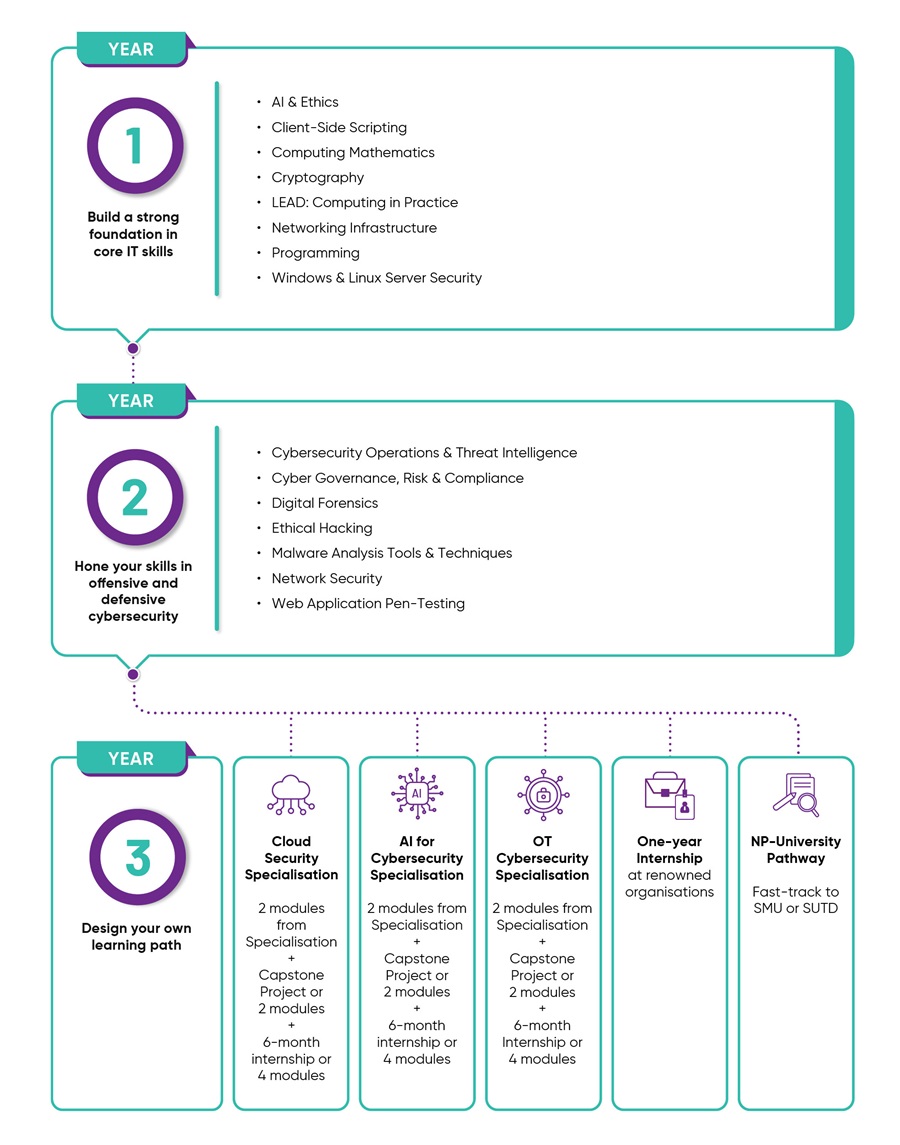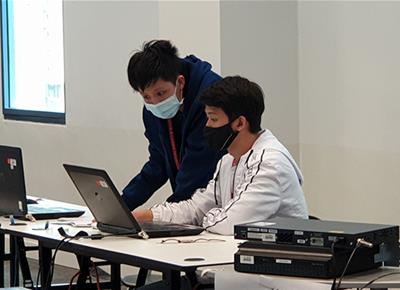Why CSF?
- Get ahead with in-demand skills at the only poly offering specialisations in AI for Cybersecurity, Cloud Security and Operational Technology Cybersecurity New!
- Go on a one-year internship at renowned organisations or pursue the MINDEF’s Polytechnic Cyber Work-Learn Scheme to build deeper skills and networks
- Industry-driven curriculum curated with leading industry partners such as Cisco Systems, Palo Alto Networks, Group-IB, Darktrace, and Red Hat
- Boost your portfolio with up to 8 industry-recognised certifications such as Security+, Certified Ethical Hacker, and Cisco Certified Network Associate
- Kickstart your degree with the NP-University Pathway and earn credits towards your degree while still in poly
- Passed GCE O-Level Computing? Save up to 75 curriculum hours! New!
About CSF
As a digital warrior, you’re ready to join the fight against cybercrime. With the Diploma in Cybersecurity & Digital Forensics (CSF), you will play a crucial role in keeping data, applications, networks, and systems safe.
Learn with cutting-edge technologies and an industry-driven curriculum curated with leading partners, ensuring you stay at the forefront of the cybercrime battle. You’ll gain practical expertise in:
- Windows & Linux server security
- Cybersecurity operations
- Threat intelligence
- Network security
- Digital forensics
- Malware analysis
- Ethical hacking
- Web application pen-testing
Immerse yourself in realistic cybersecurity scenarios
with CSF’s hands-on learning approach. You will learn
to use industry-recognised platforms and tools such as
Cisco’s Networking Academy, EC-Council’s CodeRed &
CyberQ, Group IB’s Managed Extended Detection and
Response (Managed XDR), and many more. You will
also have the chance to work on real-world projects
in areas such as bug hunting, penetration testing, and
cyber threat intelligence. Plus, hone your cybersecurity
skills through masterclasses led by cybersecurity
professionals and put your abilities to the test in
exciting Capture the Flag competitions.
Fast-track your university journey with our pathways to SMU and SUTD and pursue university modules when in NP! Through the NP-SMU Pathway, gain credit exemptions for SMU's Information Systems, Computing Science and Software Engineering programmes. Meanwhile, the Poly SUTD Scholars Programme allows you to explore humanities and science modules that count towards your degree at SUTD.
Embark on a tailored learning journey in your third year by selecting from our specialisations.
- AI for Cybersecurity
Dive into the future of cybersecurity with training co-developed by global leader Darktrace. Master advanced machine learning and deep learning applications, and gain expertise in cutting-edge AI tools and techniques designed to protect against modern threats. - Cloud Security
Deepen your cloud computing skills and explore essential cloud security tools and techniques. Delve into cloud native security practices to safeguard cloud infrastructure against vulnerabilities. - Operational Technology (OT) Cybersecurity
Equip yourself with in-demand, hybrid IT-OT competencies for today's cybersecurity landscape. With modules such as AI in OT Cybersecurity and Industrial Automation, you'll be equipped to protect critical infrastructure in fields such as energy, healthcare and transport!
Pursue either a six-month or a one-year internship
at leading organisations such as A*STAR, Bank of
America, CSA, CSIT, DSO, DSTA, Ensign, Group-IB,
NTT, Oracle, PwC, Singtel, and ST Engineering to
kickstart your cybersecurity career with real-world
experience.
Additionally, gain industry-recognised certifications
such as Security+, Certified Ethical Hacker, Computer
Hacking Forensic Investigator, Cisco Certified Network
Associate, Certified Cloud Security Engineer, Certified
SOC Analyst, Red Hat Certified System Administrator
and Certified Engineer, AWS Certified Cloud
Practitioner, and Palo Alto Networks Certified Network
Security Administrator
Passed GCE O-Level Computing? Enjoy an automatic exemption from Programming Fundamentals – giving you more time to take on projects, certifications and competitions.
Overview of Your CSF Journey

Inspiring Portfolio
Further Studies
Explore related degree programmes locally or overseas. You may enjoy advanced standing when you apply for related courses at universities abroad.
Singapore
- Nanyang Technological University
- National University of Singapore
- Singapore Institute of Technology
- Singapore Management University
- Singapore University of Technology and Design
- Singapore University of Social Science
Australia
- Monash University
- Queensland University of Technology
- University of Adelaide
- University of New South Wales
- University of Queensland
- University of Sydney
Careers
The global demand for IT cybersecurity professionals is growing rapidly, and Singapore is building a strong talent pool to meet this need. Our course aligns with the ICT Skills Framework - Cybersecurity Track, preparing you for exciting career paths such as:
- Associate Security Analyst / Engineer
- Cyber Risk Analyst
- Forensic Investigator
- OT Cybersecurity Systems Analyst
- Security Engineer / Executive
- Security Operations Analyst
- Vulnerability Assessment and Penetration Testing Analyst
NP-DIS-Cyber Work-Learn Scheme
The Cyber Work-Learn Scheme is organized by DIS, the digital service branch of the SAF, responsible for providing military intelligence, building up the country’s digital defense capabilities, and protecting the psychological well-being of its military personnel.
Key Features of the Cyber Work-Learn Scheme:
- Early enlistment to participate in the Work-Learn scheme
- Concurrent fulfillment of internship requirements while serving National Service (NS)
- Completion of NS alongside polytechnic peers, allowing for timely university matriculation (if eligible)
- Regular salary and benefits starting upon fulfillment of the minimum service period
- Sponsorship of third-year polytechnic fees by SAF DIS for selected candidates
Established as the fourth Service of the SAF, the Digital and Intelligence Service will raise, train and sustain digital forces and capabilities to fulfil its mission to defend the peace and security of Singapore from the evolving and increasingly complex threats in the digital domain. The DIS plays a critical role in defending Singapore from threats in the digital domain, and allows the SAF to operate better as a networked and integrated force to deal with a wider spectrum of external threats to enhance and safeguard Singapore's peace and sovereignty. The DIS collaborates with partners across the MINDEF, SAF, Whole-of-Government agencies and like-minded partners in academia and industry in defending our nation against threats in the digital domain.
Ngee Ann Polytechnic is proud to partner the DIS for the Polytechnic Cyber Work-Learn Scheme (WLS), which was announced at MINDEF’s 2024 Committee of Supply Debate. Under the DIS-NP Cyber WLS, successful applicants enrolled in the Diploma in Cybersecurity & Digital Forensics are able to enlist one year earlier than their schoolmates, while having their military service with the SAF recognised towards the fulfilment of their polytechnic’s final-year internship requirements.
Under the DIS-NP Cyber WLS, Cyber Specialists will perform cybersecurity roles such as cyber forensics, incident response, malware analysis and penetration testing.
Applications for the DIS-NP Cyber WLS is open to all National Service pre-enlistees who are in their second year of the Diploma in Cybersecurity & Digital Forensics.
Entry Requirements
AGGREGATE TYPE ELR2B2-C
To be eligible for consideration, candidates must have the following GCE ‘O’ Level examination (or equivalent) results.
| Subject | 'O' Level Grade |
|---|---|
| English Language | 1-7 |
| Additional Mathematics/Mathematics | 1-6 |
| Any one of the 2nd group of Relevant Subjects for the ELR2B2-C Aggregate Type | 1-6 |
Applicants must also fulfil the aggregate computation requirements for the ELR2B2-C Aggregate Type ( English Language, 2 relevant subjects and 2 other best subjects) listed at www.np.edu.sg/docs/ELR2B2.pdf.
For students with other qualifications, please refer to the NP website for the entry requirements and admissions exercise period.
Candidates with severe vision deficiency may encounter difficulties meeting the course requirements and expectations.
What You Will Learn
LEAD: Computing in Practice (4 Credit Units)
This module provides a foundation understanding of how Legal Technology, Software Engineering, Data Analytics and Cybersecurity interrelate and contribute to digital transformation across industry. It aims to strengthen students' appreciation of the ethical, legal and professional dimensions of technology and its role in shaping responsible innovation.
Students will engage in thematic clusters that explore topics such a data analytics, cybersecurity awareness, digital governance and emerging technologies. Each cluster incorporates experiential learning through applied projects, industry talks and site visits that promote a practical understanding of computing in context. By the end of the module, students will have developed a holistic understanding of the ICT landscape and its applications in real-world practice.
AI & Ethics (2 Credit Units)
This module introduces students to the foundational concepts of Artificial Intelligence (AI) and the ethical challenges that arise in its design, development, and deployment. Students will explore how AI technologies impact individuals, organizations, and society at large.
Through a blend of theoretical frameworks and practical case studies, students will critically examine key ethical principles including fairness, accountability, transparency, privacy, and human well-being. The module emphasizes the importance of ethical reasoning and responsible innovation in ICT, preparing students to navigate complex moral dilemmas in real-world AI application development.
Programming Fundamentals (5 Credit Units)
This module introduces the fundamentals of programming and how to develop programs using appropriate problem-solving techniques in a modular style. In this practice-oriented module, students are taught how to apply problem-solving skills using a top-down structured programming methodology and given ample practice in translating solutions into computer programs, followed by testing and debugging of the programs. Topics include data types, variables, expressions, statements, selection structures, loops, simple computation and algorithms, functions and the use of libraries. Students will also practise the use of pseudocode and flowcharts, leveraging Gen AI productivity tools, best practices of programming, debugging techniques, development of test cases, and suitable program documentation. In addition, they will study various areas where application software plays a prominent part in helping organisations to solve problems. Students will be given ample opportunity for independent and self-directed learning.
Computing Mathematics (4 Credit Units)
This module introduces the basic concepts of relations and functions, matrices and methods of statistics and their applications relevant to IT professionals.
The main emphasis in this module is to develop students’ ability in solving quantitative problems in computing mathematics, probability and statistics. Topics covered include fundamentals of statistics and probability, discrete and continuous probability distributions.
Health & Wellness^ (1 Credit Unit)
This module provides you with an opportunity to keep fit, be active, and stay physically and mentally healthy. It equips you with practical knowledge and skills to be responsible in maintaining your overall personal health through appropriate exercise, monitoring of health indicators and basic sports skill acquisition. It also seeks to improve your social and psychological well-being by fostering positive and respectful attitudes in all relationships.
Innovation Made Possible^ (3 Credit Units)
Underpinned by the Design Thinking framework and powered by the LUMA System of Innovation, this module aims to build creative confidence in you. The module will sensitise you to the human-centred problem solving approach where you will explore new ideas and come up with up with innovations to tackle problems that are close to your heart. Students who successfully complete this module will be awarded a LUMA Foundation Badge by the LUMA Institute. This internationally recognized badge signifies competence in Human-Centred Design.
^ Critical Core modules account for 13 credit units of the diploma curriculum. They include modules in innovation and world issues, as well as an interdisciplinary project. By bringing students from diverse diplomas together, the interdisciplinary project fosters collaboration to explore and propose solutions for real-world problems. NP aims to develop students to be agile and self-directed learners, ready for the future workplace.
Programming II (4 Credit Units)
This module builds upon the knowledge and skills acquired in Programming 1 (PRG1). It aims to provide opportunities for the students to develop medium-scale applications based on a different programming paradigm from procedural programming that students learnt in Programming I, such as Object-Oriented (OO) Programming, to allow students gain exposure to different approaches and techniques in programming. The main concepts of the programming paradigm and the development of applications with it will be taught in this module. A high-level programming language suitable to demonstrate the programming approach will be used.
The module may also cover the concept of Abstract Data Types (ADTs) and the implementation of selected ADTs. Use of advanced ADTs especially related to data structures, may be covered. The module may also highlight fundamental system design concepts and artifacts such as class diagrams, to reinforce the understanding of the programming paradigm and to also introduce software design concepts to students, to demonstrate the relationship between software design and development. Then, the module may introduce the use of Application Protocol Interface (API) when required.
Fundamentals for ICT Professionals (2 Credit Units)
This module provides a broad introduction to the field of ICT by exploring the roles, professional practice, ethical expectations and career development paths of IT professionals. Through a guided inculcation of interpersonal and teamwork skills with strong team bonding spirit, the module aims to deepen students committment to the sector that the course prepares them for. In addition, students will be required to begin charting their career path in the ICT industry by considering crucial aspects such as personal preferences and aptitude, job roles and responsibilities, skills needed and further education.
The module provides opportunities for course-based experience in which students can potentially engage with the local community and industry. This might include participation in community service events or in Service-Learning projects that leverage students' discipline knowledge and skills to meet identified needs. Through iterative and guided reflection on the service experience, students gain a broader appreciation of their discipline and an enhanced sense of personal voice, empathy and civic responsibility.
Cryptography (4 Credit Units)
This module covers the essential concepts of Cryptography, including Public Key Infrastructure (PKI), Digital Signature and Certificate, and the various encryption/decryption algorithms. Students will understand how Symmetric and Asymmetric (Public-Key) cryptographic techniques are used to support different security implementations, and the encryption/decryption algorithms used in these techniques. The role of Certificate Authority, how the digital certificates are generated, managed, and distributed will also be covered in detail.
Networking Infrastructure (4 Credit Units)
This module covers basic Local Area Networks (LAN) and Wide Area Networks (WAN) infrastructure including physical cabling system used for an enterprise network, and how hardware platforms such as switches, routers and wireless devices are deployed in typical networks. The module also introduces students to the major networking protocols such as Ethernet, routing protocols such as static routing, RIP and OSPF. Students will learn to configure switches and routers and will be taught the techniques to configure and troubleshoot LANs and WANs.
Windows & Linux Server Security (4 Credit Units)
This module teaches students fundamentals of Windows and Linux operating systems. It aims to teach students the application of Windows and Linux knowledge in a practical and useful manner. Students learn how to administer, configure, upgrade, and maintain Windows and Linux servers. Students also learn tools and concepts needed to efficiently build and manage a production Windows and Linux infrastructure. Students will learn about different deployment roles of Windows and Linux Servers, such as Active Directory, Domain Controller, Web Server, Email Server, DNS Server, and File Server. Techniques on server hardening and to create users, groups and define security group policies are also taught in this module.
Client-Side Scripting (2 Credit Units)
This module teaches skills such as HTML, CSS, and JavaScript, required to develop responsive websites and web applications. The skills acquired will help students to better understand client-side web application attacks, a prelude to developing secure web applications and web application pen testing, which are covered in the subsequent modules in this course.
Confident Communication: Find Your Voice (VOICE) (3 Credit Units)
The VOICE module aims to empower students to become thoughtful and confident communicators able to tailor a message to suit audience, purpose and context. Students will learn how to use storytelling structures and techniques, persuasive strategies and effective visuals to connect meaningfully with their audience. Through a personalised growth plan, the module encourages students to reflect, set goals and take ownership of their growth and development as communicators. The module employs engaging teaching strategies such as games, thinking routines, masterclasses and workshops, and a celebratory showcase festival at the end to make learning fun and exciting.
^ Critical Core modules account for 13 credit units of the diploma curriculum. They include modules in innovation and world issues, as well as an interdisciplinary project. By bringing students from diverse diplomas together, the interdisciplinary project fosters collaboration to explore and propose solutions for real-world problems. NP aims to develop students to be agile and self-directed learners, ready for the future workplace.
Web Application Pen-Testing (4 Credit Units)
This module provides a thorough understanding of major web application vulnerabilities and their potential impact on people and organisations. The module teaches a repeatable web pen-testing methodology, which includes reconnaissance, mapping, discovery, and exploitation of web application vulnerabilities and flaws. Students are taught how to write a web application pen-test report.
The module teaches students the pen-tester’s perspective of web applications. It trains students on building a profile of the machines that host the target web application and come up with a map of the web application's pages and features. Students are also trained in web application attack tools and interception proxies that are used to discover and exploit key web application vulnerabilities.
Ethical Hacking (4 Credit Units)
This module aims to develop Penetration Testers for the information security industry. They will be taught to follow a process model to locate and establish targets, find vulnerabilities, exploit the flaws to determine potential impact and business risk with the goal of helping the owner improve security practices. Students will learn the techniques intruders use to hack a system, and the steps to secure it. Students will have hands-on practice on actual pen-testing that involves reconnaissance to map out IT infrastructure, scanning vulnerable systems, and developing attack vectors to exploit loopholes in a system. Students will also be taught the necessary countermeasures to mitigate risks of exploitation though system hardening, intrusion detection and prevention.
Network Security (4 Credit Units)
This module provides an in-depth knowledge on network security in a defensive view. It covers various types of firewall technologies, Virtual Private Networks (VPNs), and Intrusion Detection/Prevention Systems (IDS/IPS). Students will have a chance to configure and deploy state-of-the-art networking devices in a typical computer network. Students will be taught skills to identify the internal and external threats against a network and to propose appropriate security policies that will protect an organization’s information. Students will also learn how to implement successful security policies and firewall strategies in this module.
Malware Analysis Tools & Techniques (4 Credit Units)
This module teaches a repeatable malware analysis methodology, which includes static analysis, code analysis, and behavioural analysis. Students are taught how to write a malware analysis report on a target malware. Students will be able to determine the malware’s indicators of compromise needed to perform incident response triage.
This module trains students to efficiently use network and system monitoring tools to examine how malware interacts with the file system, registry, network, and other processes in an OS environment. Students are also trained to decrypt and analyse malicious script components of web pages, identify and examine the behaviour of malicious documents, and apply memory forensics techniques to analyse complex malware and rootkit infections.
ICT Career & Professional Preparation (3 Credit Units)
This module provides a stepping stone to the students in their IT career. Students are given an insight into the InfoComm industries and are kept updated with the latest skill sets required in their IT career path. They also have the opportunity to be exposed to various institutes of higher learning to further acquire their skill sets. Industry talks and seminars are organised to keep students up-to-date on emerging trends so as to build up their interpersonal, team and networking skills with the community and industry.
World Issues: A Singapore Perspective^ (2 Credit Units)
This module will expose you to a wide range of global issues discussed in the context of Singapore as a nation state. You will be guided to critically examine current affairs from various perspectives and develop an appreciation of the dynamism behind current world problems and consider possible solutions. The intent of this module is to develop thinking students with well-considered perspectives who are able to articulate reasonable opinions, make thoughtful decisions and informed choices as active citizens in society.
^ Critical Core modules account for 13 credit units of the diploma curriculum. They include modules in innovation and world issues, as well as an interdisciplinary project. By bringing students from diverse diplomas together, the interdisciplinary project fosters collaboration to explore and propose solutions for real-world problems. NP aims to develop students to be agile and self-directed learners, ready for the future workplace.
Digital Forensics (4 Credit Units)
This module which encompasses industry led activities, gives an insight into the process of forensics investigation. It covers the various types of computer
related crimes, techniques of gathering electronic evidence, and the recovery of deleted, damaged or encrypted data. Students will also make use of advanced forensic tools to perform forensic investigation. Besides the tools and techniques of investigation,
students will be taught sound forensic investigation methodology and the proper handling of evidence. The module will also cover aspects of law and policies applicable to digital forensics.
Cybersecurity Operations & Threat Intelligence (4 Credit Units)
The Cybersecurity Operations module covers the fundamentals of Security Operations Centre (SOC) operations and Threat Intelligence Life Cycle. Students will learn log management and correlation; Security information and event management (SIEM)
deployment; cyber incident detection; and incident response; and various cyber threats and threat actors. Additionally, students will learn to manage various SOC processes, procedures, technologies, and workflows; monitor and analyse logs and alerts from
a variety of different technologies across multiple platforms (IDS/IPS, end-point protection, servers, and workstations); develop threat cases (correlation rules), and create reports: plan, organize, and perform threat monitoring and analysis; and escalate
incidents to appropriate teams for additional assistance. Students will also learn about threat intelligence data collection, acquisition, management, analysis, and creation of threat intelligence reports.
Cyber Governance, Risk & Compliance (4 Credit Units)
This module examines the relevant frameworks to ensure that information assets are protected within an organization. It includes the processes and policies for administering and managing a company’s IT systems that follow the compliance
framework. Concepts on risk management process, risk analysis and mitigation will also be introduced. Students will learn to evaluate risks against the company’s critical assets and deploy safeguards to mitigate them. Control frameworks such as
PCI (Payment Card Industry), ISO 17799/27002, and COBIT will be covered.
Elective Module 1# (4 Credit Units)
Project ID: Connecting the Dots ^ (4 Credit Units)
Project ID aims to prepare you for an increasingly globalized and interconnected world where problems are multi-faceted and require interdisciplinary research and collaboration to solve. Using a project-based learning approach, you will have the opportunity to work in a multi-disciplinary team with students from across the polytechnic to investigate and propose comprehensive recommendations for a pressing real-world problem affecting Singapore. You will be guided to step out of your disciplinary silos and effectively communicate and collaborate with peers from different backgrounds. The module seeks to develop independent learning skills and the ability to synthesize diverse strands of knowledge to solve a complex problem, while impressing on you the importance of being a responsible global citizen.
^ Critical Core modules account for 13 credit units of the diploma curriculum. They include modules in innovation and world issues, as well as an interdisciplinary project. By bringing students from diverse diplomas together, the interdisciplinary project fosters collaboration to explore and propose solutions for real-world problems. NP aims to develop students to be agile and self-directed learners, ready for the future workplace.
Internship (20 Credit Units)
- Offered to only those embarking on One-Year Internship
The following modules are offered to those not taking Internship at Level 3.1
- Elective Module 2# (4 Credit Units)
- Elective Module 3# (4 Credit Units)
- Elective Module 4# (4 Credit Units)
- Elective Module 5# (4 Credit Units)
- Project ID: Connecting the Dots ^ (4 Credit Units)
Project ID: Connecting the Dots ^ (4 Credit Units)
Project ID aims to prepare you for an increasingly globalized and interconnected world where problems are multi-faceted and require interdisciplinary research and collaboration to solve. Using a project-based learning approach, you will have the opportunity to work in a multi-disciplinary team with students from across the polytechnic to investigate and propose comprehensive recommendations for a pressing real-world problem affecting Singapore. You will be guided to step out of your disciplinary silos and effectively communicate and collaborate with peers from different backgrounds. The module seeks to develop independent learning skills and the ability to synthesize diverse strands of knowledge to solve a complex problem, while impressing on you the importance of being a responsible global citizen.
^ Critical Core modules account for 13 credit units of the diploma curriculum. They include modules in innovation and world issues, as well as an interdisciplinary project. By bringing students from diverse diplomas together, the interdisciplinary project fosters collaboration to explore and propose solutions for real-world problems. NP aims to develop students to be agile and self-directed learners, ready for the future workplace.
Internship (20 Credit Units)
- Offered to only those on Six-Months Internship
Internship II (16 Credit Units)
- Offered to only those who successfully completed Internship module in Level 3.1
This module allows the student to extend their internship and undergo additional IT-related on-the-job training in a real-life working environment. In the process, the student will experience working as part of a team and may be exposed to various aspects of project planning, development, testing and delivery. In addition, students will deepen their understanding of certain IT technologies, which may include (but are not limited to) cloud computing, advanced programming, mobile or web development, DevOps processes, data analytics, enterprise systems, Internet of Things, games design and development, information security or artificial intelligence.
Project ID: Connecting the Dots ^ (4 Credit Units)
- Offered to only those taking Internship II
^ Critical Core modules account for 13 credit units of the diploma curriculum. They include modules in innovation and world issues, as well as an interdisciplinary project. By bringing students from diverse diplomas together, the interdisciplinary project fosters collaboration to explore and propose solutions for real-world problems. NP aims to develop students to be agile and self-directed learners, ready for the future workplace.
Elective Modules
AI for Cybersecurity Specialisation
Machine & Deep Learning Applications for Cybersecurity (4 Credit Units)
This module teaches students machine learning and deep learning algorithms and their applications for cybersecurity. Students will learn how to effectively use machine learning and deep learning to detect and mitigate various cyber threats and attacks.
AI Tools & Techniques for Cybersecurity (4 Credit Units)
This module trains students on various cybersecurity related AI tools & techniques used by the industry. Students will learn how to setup, configure, train, execute, operate, and manage these AI tools & techniques to harden security, detect cyber-attacks, respond to cyber incidents, and restore normal operations.
Emerging AI Trends in Cybersecurity (4 Credit Units)
This module is designed to help students keep abreast of the latest AI developments in cybersecurity, to stay current and relevant in the fast-moving industry. To achieve this objective, the syllabus for this module will be guided by AI research and feedback from industry partners, and both seminar-style and hands-on workshop teaching approaches may be adopted depending on the nature of the topic covered.
Cloud Security Specialisation
Cloud Architecture and Technologies (4 Credit Units)
This module gives insight into the key concepts and technologies of cloud computing which include cloud characteristics, service models (SaaS, PaaS, and IaaS), deployment models (Public cloud, Private cloud, Community cloud, and Hybrid cloud), and the features of cloud computing technologies. It also covers the cloud computing architecture, emerging trends and issues such as clouds for mobile applications, cloud portability and interoperability, scalability, manageability, and service delivery in terms of design and implementation issues. The module discusses the benefits and challenges of cloud computing, standards of cloud computing service delivery, and Service Level Agreement (SLAs) for cloud services. Hands-on activities are included to expose students to various cloud computing services offered by major cloud computing providers such as Amazon Web Services (AWS), Google App Engine (GAE), and Microsoft Windows Azure.
Cloud Security Tools & Techniques (4 Credit Units)
The Cloud Security module focuses on cloud security practices, technologies, frameworks, and principles. It covers topics such as cloud platform security, identity and access management, various cloud security controls, cloud data protection, penetration testing, incident handling, forensics investigation, and business continuity and disaster recovery in the cloud.
Cloud Native Architecture Security (4 Credit Units)
The Cloud Native Architecture module covers topics such as the transformative development of cloud security practices, embedding security into the DevOps process, the basics of cloud native architecture, cloud application lifecycle management, cloud networking and security, cluster Maintenance, and logging / monitoring of cloud applications. Students will also learn about the essential skills of managing containerized applications across multiple hosts in a dynamically scheduled, microservices-oriented cloud native environment.
Operational Technology Cybersecurity Specialisation
Industrial Automation (4 Credit Units)
This module aims to equip students with the basic knowledge of automation
technologies and their applications in the manufacturing and process industries.
With the rise of new digital industrial technology, known as Industry 4.0, students
will also be introduced to smart sensors and actuators using IO-Link technology.
This technology enables communication within the system (host controller) down
to the sensor level.
Major topics include electro-pneumatics technology, programmable logic control
and IO-Link technology. The essential hardware components used in automated
systems, such as sensors, valves and actuators will be applied to the automated
systems. Widely accepted industrial control programming language ladder and
inline structured text will be covered, in conjunction with the learning of
programming logic controllers and computer interfaces.
Laboratory work involves hands-on circuit construction and implementation using
these various technologies and techniques, which enhances students’
understanding of the practical aspects of circuit designs.
Fundamentals of OT Cybersecurity (4 Credit Units)
With Industry 4.0, the modern Industrial Control System (ICS) are facing more
advanced threats from the Internet outside as a result of the Informational
Technology/ Operational Technology (IT/OT) convergence. Protecting them
through Operational Technology (OT) cyber defense is an evolving field required
to continually adapt cybersecurity strategies so as to maintain the safety and
reliability of production operation.
This module aims to equip students with the knowledge of design, maintenance
and protection functions within the Operational Technology (OT) environment.
Using a case study of a simulated environment with Industrial Internet of Things
Capability (IIoT) capability, the student perform activities with relevance to OT
cybersecurity administration and maintenance in order to establish a secure OT
environment. This includes performing asset discovery, managing vulnerabilities
in existing OT systems, as well as performing access control management
across OT systems and devices
In addition, the module also introduces the concept of industrial networking and
various cyber security standards, protocols and frameworks and are
knowledgeable in using various cybersecurity tools to perform their job
accordingly
AI in OT Cybersecurity (4 Credit Units)
This module explores the application of Artificial Intelligence (AI) and Machine
Learning (ML) in securing Operational Technology (OT) environments. Students
will examine the unique challenges of OT systems, such as real-time constraints,
legacy infrastructure, and safety-critical operations, and learn how AI can be
used to enhance threat detection, anomaly detection, predictive maintenance,
and incident response. The course combines theoretical foundations with
practical, hands-on exercises using simulation tools and real-world datasets.
This module aims to provide learners with a comprehensive understanding of the
fundamentals of OT systems and how they differ from IT systems. It aims to
equip learners with the ability to identify key cybersecurity risks in OT
environments and understand the role of AI and ML in detecting and preventing
threats. The module also focuses on applying anomaly detection techniques to
OT network traffic using machine learning, evaluating the effectiveness of AI
models in detecting cyber threats within OT environments, and designing and
implementing basic AI-powered OT security solutions in simulated environments.
Capstone Project (8 Credit Units)
In this module, students are required to complete a substantial project that is the culmination of their education in the School of InfoComm Technology. The project can be a real-world problem proposed by a client, or it can be proposed by the student in pursuit of their personal interests.
Internship II (16 Credit Units)
This module allows the student to extend their internship and undergo additional IT-related on-the-job training in a real-life working environment. In the process, the student will experience working as part of a team and may be exposed to various aspects of project planning, development, testing and delivery. In addition, students will deepen their understanding of certain IT technologies, which may include (but are not limited to) cloud computing, advanced programming, mobile or web development, DevOps processes, data analytics, enterprise systems, Internet of Things, games design and development, information security or artificial intelligence.






